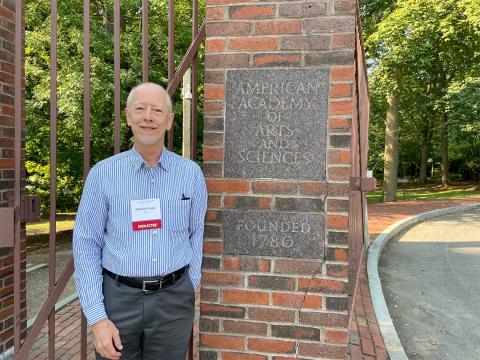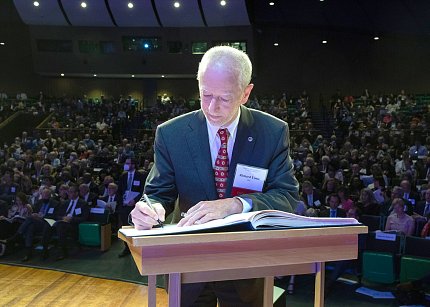NINDS’s Youle Honored by American Academy of Arts and Sciences

Dr. Richard Youle, a senior investigator in the biochemistry section of NINDS’s Surgical Neurology Branch (SNB), was recently inducted into the American Academy of Arts and Sciences.
According to the academy—which was established in 1780—the honor recognizes extraordinary people who help solve the world’s most urgent challenges, create meaning through art and contribute to the common good from every field, discipline and profession.
“It was such a surprise to be elected to the illustrious American Academy of Arts and Sciences,” said Youle, who was elected as a member of their class of 2021. However, due to Covid-19 delays, the in-person induction ceremony was deferred to September 2022. “This honor and the fun induction ceremony are highlights of my career that I will always cherish.”

Youle earned his bachelor of arts degree from Albion College in Michigan and his Ph.D. in biology from the University of South Carolina, where he studied the protein toxin ricin. He came to NIH in 1978 to complete postdoctoral work on engineering new cell-type-specific protein toxins in the lab of Dr. David Neville at NIMH.
Youle joined NINDS in 1985 as a principal investigator in SNB. There he studied a wide range of subjects, including bone marrow transplantation and programmed cell death, and developed and conducted clinical trials of new therapies for brain tumors.
Most recently, Youle and his colleagues discovered functions and interrelationships among proteins mutated in familial Parkinson’s disease. Their research suggests that the mutations may be linked to a breakdown in the way brain cells dispose of damaged mitochondria in a process called mitophagy. The results have led to a better understanding of the role genes play in the healthy and diseased brain and opened new avenues for therapy of Parkinson’s disease that are being pursued by numerous biotech companies. For this work, Youle won a Breakthrough Prize in Life Sciences in 2021.
His laboratory currently is focused on molecular mechanisms of autophagy (the process in which the body breaks down and destroys old, damaged cell parts), mitochondrial quality control and neurodegenerative disorders.—Shannon E. Garnett
